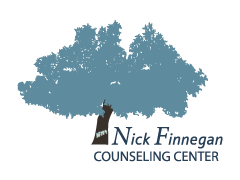Hallie Thompson
 You are Nick’s cousin. Tell us why supporting the counseling center means so much to you.
You are Nick’s cousin. Tell us why supporting the counseling center means so much to you.
After Nick’s death, I wanted to be involved with NFCC because it was a way for me to hold on to a piece of him, to remember his beautiful life, and to turn my grief into something positive. I also wanted to support my aunt, uncle, and cousins in their path forward. It has been amazing to watch NFCC grow from a ministry of St. Luke’s United Methodist Church to its own non-profit.
I have also had my own personal mental health struggles and I have come to see the value in counseling for myself and the community. Nick was full of joy and he truly lived life to the fullest. I think the counseling center is a great way of keeping his memory alive because therapy allows people to live their lives to the fullest, just like he did.
You’ve seen the counseling center from the beginning, what do you think is the most important work NFCC does?
NFCC is so special because it makes access to mental health care more affordable through their sliding scale. Mental healthcare is healthcare, not a privilege and should be available to everyone. I am lucky in that I have been able to seek help and regularly go to therapy. I cannot imagine wanting to help yourself through counseling and not being able to because of finances.
I also think NFCC does a great job with their outreach. I especially love their Instagram page because it normalizes talking about mental health issues. We’ve come such a long way in de-stigmatizing mental health but many people still struggle to seek professional help for their brain, which is our most important organ. I wish people knew that seeking help doesn’t mean you are broken. It takes incredible strength to seek help and be vulnerable in therapy. NFCC helps to break down that barrier and does such a great job working to destigmatize seeking help.
How do you take care of your own mental health?
Therapy is the number one thing for me, it’s been the best gift I’ve ever given myself and my family. I was diagnosed with anxiety in my 30s, but I struggled with it for a long time before then and I regret not seeking help sooner. It is also reassuring to know that I have therapy as a safety net for any future challenges in life I may face.
You chaired NFCC’s Annual Crawfish Boil in 2016. What drew you to that event?
I think the Crawfish Boil is such a unique event for different generations to come together because it welcomes families with young children and it truly is so fun! I genuinely look forward to it every year and it’s been so neat to see the new names added to the host committee each year, it’s such a tangible way to see the growth of support for NFCC in the community. I love that it introduces younger people to counseling, because if each generation learns to take care of themselves and seek out therapy, it can change their lives and their children’s lives. Therapy is so key in changing generational cycles. I know that I continue to support the Crawfish Boil and NFCC because of my kids. I want them to grow up in a world where mental health issues are not stigmatized and where everyone has access to care. I truly believe counseling can change lives and change the world.
